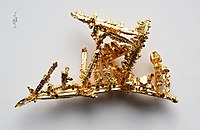PreciousMetal
1293jdhdfoierkjdjd/finance/api/quoteE31000000000004917/baseE31100000000000897

#wikipedia.org. × gold. Gold is a chemical element with the chemical symbol Au (from Latin aurum) and atomic number 79. In its pure form, it is a bright, slightly orange-yellow, dense, soft, malleable, and ductile metal. Chemically, gold is a transition metal, a group 11 element, and one of the noble metals. It is one of the least reactive chemical elements, being the seco
#Dec.31.2999 ×

#wikipedia.org. × United States dollar. The United States dollar (symbol: $; currency code: USD; also abbreviated US$ to distinguish it from other dollar-denominated currencies; referred to as the dollar, U.S. dollar, American dollar, or colloquially buck) is the official currency of the United States and several other countries. The Coinage Act of 1792 introduced the U.S. dollar at par w
#Dec.31.2999 ×

#economist.com. × Khartoum changes hands, heralding a new phase in Sudan’s civil war. The national army may now try to push into Darfur
#Mar.30.2025 ×

#economist.com. × The war in Gaza has unsettled the Jewish diaspora. They have found uneasy alliances with their new protectors on the right
#Mar.27.2025 ×

#economist.com. × Israel courts the Middle East’s minorities. Why Israel seeks alliances outside the Arab and Sunni Muslim majority
#Mar.27.2025 ×

#economist.com. × Nigeria’s president pushes the limits of his power. A crisis in the oil-rich Niger Delta raises questions about the rule of law
#Mar.27.2025 ×

#economist.com. × A faster rollout of malaria vaccines would save many lives. But someone needs to pay for it—and aid budgets are being slashed
#Mar.24.2025 ×

#economist.com. × America’s strikes on the Houthis could whip up a regional tempest. Donald Trump has promised to hold Iran accountable for the Yemenis’ attacks
#Mar.20.2025 ×

#economist.com. × A coup attempt in Tigray raises tensions in the Horn. Ethiopia and Eritrea are engaged in a dangerous game of brinkmanship
#Mar.20.2025 ×

#economist.com. × Nigerian politics is a nasty place for women. A sexual-harassment scandal in parliament shows why
#Mar.20.2025 ×

#economist.com. × The success of Ivory Coast is Africa’s best-kept secret. How has it managed to outshine its peers?
#Mar.20.2025 ×

#economist.com. × Israel’s strikes may be only the start of a new offensive in Gaza. Politics mean Binyamin Netanyahu needs to keep open the possibility of a return to full-scale war
#Mar.18.2025 ×

#economist.com. × Binyamin Netanyahu is leading Israel into (another) crisis. His decision to sack the security chief will not end well
#Mar.17.2025 ×

#economist.com. × Netanyahu’s decision to sack his security chief will not end well. Another crisis in Israel looms
#Mar.17.2025 ×

#economist.com. × Another civil war looms in South Sudan. It could merge with the one in neighbouring Sudan, to catastrophic effect
#Mar.13.2025 ×

#economist.com. × Binyamin Netanyahu likens himself to Donald Trump. Israel’s prime minister is again under pressure from lawyers and security men
#Mar.13.2025 ×

#economist.com. × After the bloodshed, can Syria’s president unite his country?. A deal with the Kurds may yet shore up Ahmed al-Sharaa’s rule
#Mar.13.2025 ×

#economist.com. × Abiy Ahmed’s agricultural revolution is too good to be true. The prime minister claims to have made Ethiopia Africa’s breadbasket. The numbers disagree
#Mar.13.2025 ×

#economist.com. × The budget that will determine South Africa’s future. It could make or break its governing coalition
#Mar.11.2025 ×

#economist.com. × South Africa’s government is looking fragile. A spat over the budget exposes deepening rifts
#Mar.11.2025 ×

#economist.com. × A horrific killing spree shakes Syria. Fresh atrocities suggest a country spiralling out of control
#Mar.10.2025 ×

#economist.com. × Lebanon’s new government must do three big things immediately. It needs money to reform, but donors want to see reforms before they write cheques
#Mar.06.2025 ×

#economist.com. × Why some Africans see opportunity in foreign-aid cuts. They want to be more self-reliant. But that will not be easy
#Mar.06.2025 ×

#economist.com. × Israel’s army adopts a high-stakes new strategy: more terrain. It remains present inside Syria, Lebanon, Gaza and the West Bank
#Mar.03.2025 ×
Showing 1-22 of 22 items - Time: 0.2291 s. Memory: 15.6361 mb.